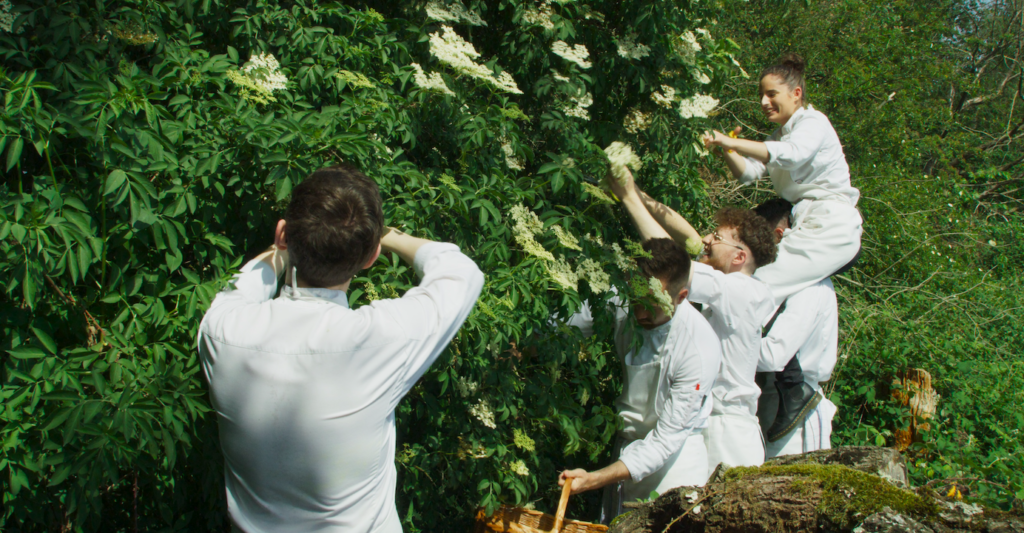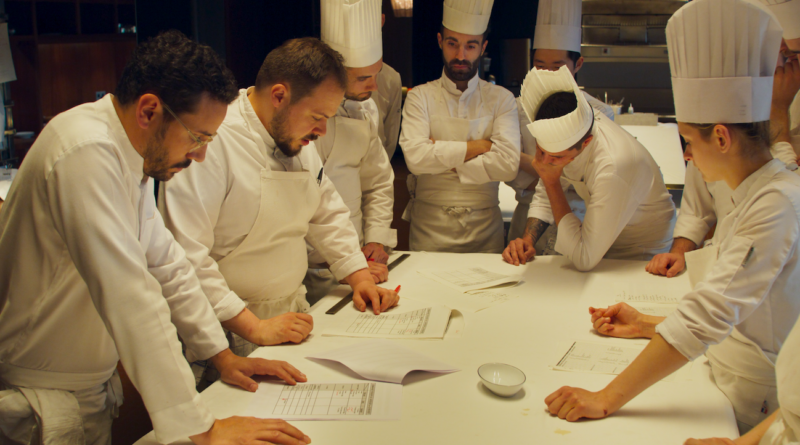INTERVIEW: Frederick Wiseman sits down for dinner
Photo: Menus-Plaisirs — Les Troisgros follows the inner-workings of a Michelin-rated French restaurant. Photo courtesy of PBS / Provided by press site with permission.
Frederick Wiseman, the extraordinarily prolific documentarian, is back with a new film that details the inner-workings of a Michelin-rated restaurant in the countryside of France. Over the course of more than four hours, Menus-Plaisirs — Les Troisgros follows the workers and chefs at the family-owned Troisgros restaurant. There are visits to the local market to find the best greens, plus stops at a farm, vineyard and cheese factory. But the real magic happens in the kitchen as Michel Troisgros and his sons make culinary delights with the utmost of care. This is a family affair, with everyone having an established role to play. Menus-Plaisirs — Les Troisgros recently premiered on PBS and is now available on PBS.org and on the PBS app.
“I like to go to good restaurants — good, inexpensive restaurants,” Wiseman said in a recent phone interview. “One of the pleasures of living in Paris is that there are a lot of good places to eat that aren’t expensive.”
Wiseman is a filmmaker known for his movies that depict the processes of institutions and the intricacies of various communities. His recent filmography includes everything from Monrovia, Indiana to In Jackson Heights to Crazy Horse. His films showcase an obvious interest in the United States and his current home country of France. He came to this new story by pure chance.
“A friend of mine and his wife invited me to stay with them in Burgundy in the summer of 2020 to try and avoid COVID, and I wanted to thank them for putting up with me for months,” Wiseman said. “And so I looked at Michelin for a good restaurant nearby, and I found this three-star restaurant called Troisgros, which I had never heard of before. We went there for lunch, and after lunch, César, who is the fourth-generation son, came out and worked the room, as they always do to say hello to the guests and ask them how they enjoyed the meal. They came to our table, and without planning to do it in advance, I sort of blurted out, ‘I make documentaries, and did you ever consider a documentary made about the restaurant?’ He said, ‘Let me talk to my father.’ And he came back 30 minutes later and said, ‘Why not.’ I discovered a year later when they came to see the final film that his father wasn’t there that day, but he looked me up on Wikipedia. And I guess he liked what he saw, so that was how I got the ‘Why not’ response. After that, I went there a couple of times, and we exchanged letters. And I started shooting the film in the spring of 2022.”
Wiseman waited a bit to start filming the project because he wanted the COVID-19 pandemic to settle down a bit, this way he didn’t have to film visitors and cooks with masks. For Wiseman, who is like a master artist, the face is key to understand one’s intentions and personality.
“They were open through part of COVID actually,” he said. “They closed for three months in the beginning, but they were open. But I didn’t want to shoot the film with people wearing masks. You can’t eat with a mask on. Even in the kitchen, I think there’s only one shot of somebody wearing a mask because part of the story in all of the films is to see closeups of people’s faces. That’s always of great interest because people’s expressions and faces and what happens to faces over time is always of interest.”
Filming in the kitchen of Troisgros was difficult. Although the facility has an open plan with plenty of room for the cooks to mill about, Wiseman was worried about getting in the way and cramping the space.
“It was extremely difficult because I didn’t want to annoy the chefs,” he said. “There were 15 people working in the kitchen, and it was an open space, as you see in the film. They move very quickly, and I didn’t want them to feel that we were interfering. So we had to be very, very alert and also try to anticipate their movements in the extent that we could, or be sufficiently far away so if they moved abruptly they weren’t going to bump into us. There was never a moment when they bumped into us or we interfered with what they were doing. It was an extra level of concentration during the shooting. I didn’t want the kitchen staff to be annoyed by our presence. Since they put up with us for seven weeks, I assume they weren’t annoyed.”
As Wiseman hit the record button, the project kept expanding. Soon enough, he realized the story of this restaurant extended beyond the walls of the kitchen and included the local area and the ingredients that come from the nearby French farms and vineyards.
“Michel and César always told me what they were going to do,” Wiseman said. “If they were going to do something other than prepare the meals on a given day, they told me, so I was able to go with them. I discovered the vineyard or the cattle farm or the cheese factory because they told me about it. One of the things that’s characteristic of all these movies is you’re very dependent on informants, not necessarily in the FBI sense of the word, but people who know more about the place than I do. I make it clear to them in the beginning that I’m very dependent on their goodwill in telling me what they might be doing, which takes place outside what I might come across in the kitchen or the restaurant. Michel was saying, ‘Well, I’m going to the vineyard tomorrow afternoon. Do you want to come?’ I said, ‘Sure.’ The guy in charge of cheese would say, ‘I’m going to a cheese factory early tomorrow morning. Do you want to come?’ The answer is always, ‘Yes.’ It’s establishing goodwill with the staff in the beginning so that they feel comfortable telling me about it and my being present.”
By John Soltes / Publisher / John@HollywoodSoapbox.com
Menus-Plaisirs — Les Troisgros recently premiered on PBS and is available on PBS.org and the PBS app. Click here for more information.


